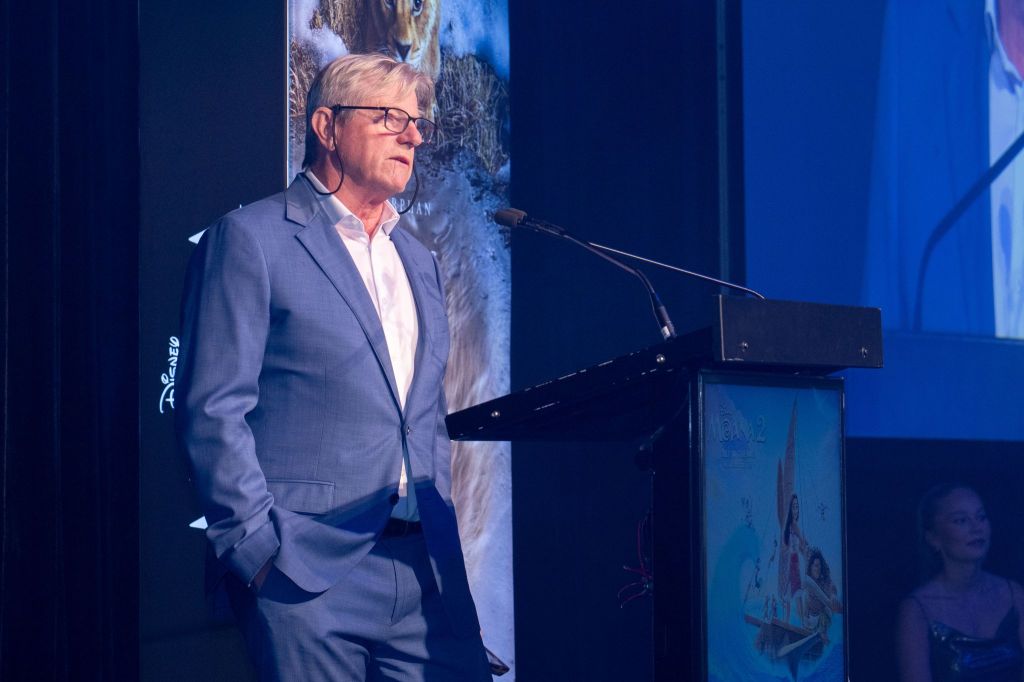Stephen Basil-Jones has gained countless insights over his 30-plus years in the film industry, but one early lesson stands out.
“I’ll never forget an early screening I took my wife to,” he recalls. “It was a film by a first-time director, shown to an audience of film programmers and distributors. A few of them didn’t like it. But my wife, who wasn’t in the industry, was so moved that she couldn’t help but speak up. I loved it too.”
The film in question was Strictly Ballroom, and the debut director was Baz Luhrmann.
“I saw the destiny of that little film and how it became iconic. It was a stark reminder of how the industry works. For all the brains and experience in that room, it was divided, and that’s what the business is… William Goldman said it best…’Nobody Knows Anything‘.”
Basil-Jones’ unique understanding of the film business as one of its most astute marketing executives saw him awarded the Murray Forrest Lifetime Achievement Award at the Australian International Movie Convention last month. He is currently based in LA where he leads Sony’s international marketing division, overseeing the studio’s marketing campaigns across almost 100 countries.
“Film is a little bit like art in some respects,” he says. “There is a sensitivity around it. It’s not an exact science. That’s what’s really great about it and that’s what I love.”
Sony has its share of franchise films (James Bond, Spider-Man) but Basil-Jones has also been heavily involved in stewarding foreign language and art-house films over his career. After his appointment as Sony Pictures Releasing (Australia) in 1996, he initiated an Asian film release program which included Not One Less, The Road Home, and Crouching Tiger, Hidden Dragon.
“The sensitivity and delicacy of really small arthouse films – curating them for their audience in a way that’s very different from the big blockbusters – that’s been one of the things I’ve cherished the most. Just securing a screen can change the destiny of a filmmaker or a particular cast member.”

In 2001, he transferred overseas and began overseeing Sony Picture’s international distribution efforts in Mexico, Italy, Belgium, Holland, Scandinavia, and Australasia. His career in international distribution, including a stint at DreamWorks, continued to expand over the years.
“I always make the analogy that distribution is the gun, marketing is the bullets, and without each other, they lose their potency. The real power comes when you’ve got them in sync. You get the right release date, platform, and then you bring those marketing elements to bear.”
While blockbusters such as the Spider-Man films have their own marketing inertia, other films usually require tailored campaigns in different markets around the world to ensure they resonate with their respective audiences.
“Internationally, every film has a different sense of being in each market and/or region,” he says.
“We listen and talk to our markets getting feedback about what their audience wants from each film. So for a romantic drama in China, they love to make people cry. So what are those emotional elements we can really play up to in China to make it resonate more? The UK may just want more of the strong drama and the narrative.”
The Australian film challenge
Basil-Jones still reads scripts weekly – studio films in development or spec films – to determine what may appeal to different regions or more broadly. He has supplemented the studio’s film slate over his career with local film acquisitions, ranging from script stage to finished product. Australian films include John Farnham documentary, Finding the Voice (2023), Storm Boy (2019), Ladies in Black (2018), Spin Out (2016), Red Hill (2010), Gabriel (2007), The Proposition (2005), A Little Bit of Soul (1998), and Napoleon (1996).
Sony plans to release at least two major Australian films in 2025, including Bruce Beresford’s next film.
“We want to work on Australian films and we want them to be successful. We’ve got stories to tell. The problem is, a lot of the stories we want to tell are not commercial and not broadly appealing. That’s the difficulty – trying to balance great, creative stories that have a commercial proposition.
“We’re balancing our overall Hollywood slate with the Australian projects, but they’re always very risky. They don’t travel well internationally, so you’ve got to find projects that are going to work really well in Australia and hopefully, you might get some icing on the top from New Zealand.”
Bruce Beresford’s comedy-drama Ladies in Black was the top-grossing Australian film of that year ($12.14 million) and Finding the Voice was the biggest theatrical documentary in history, but Patrick Hughes’ western Red Hill underperformed at the box office despite its quality. “He still went on after that to direct some big Hollywood films, because they could see his talent as a director.”
The recent AIMC, where Basil-Jones accepted the Murray Forrest Lifetime Achievement Award, saw distributors sharing their upcoming film slate with exhibitors. The future of cinema is again looking brighter as audiences return to cinemas thanks to a stronger slate after the 2023 writer and actor strikes.
“I love the business and working out whether a film is going to be a hit or a miss, being surprised, and where the studios are pushing, be it genre, scale, talent, or director talent.”
Stephen Basil-Jones career appointments
- Member of The Academy Motion Pictures Arts & Sciences (AMPAS) since 2022.
- Member of British Academy of Film & Television (BAFTA-UK) since 2003.
- Executive board director – Screen NSW (2001-2003)
- Board director – Sydney Film Festival (2008, 2009)
- Board director – Australians in Film (Los Angeles 2002 – 2004)
- Australian chair of the Motion Pictures Distributors Association (2001, 2009, 2015, 2022)


